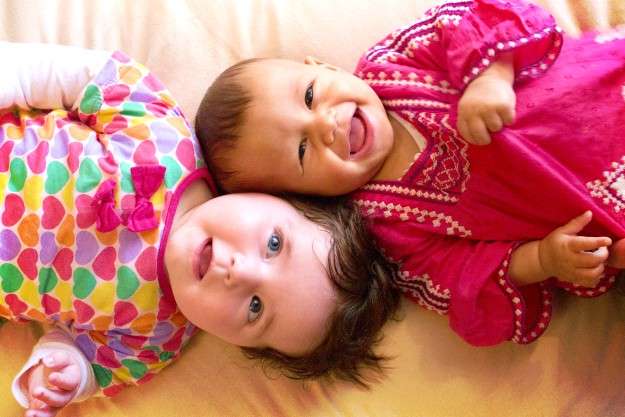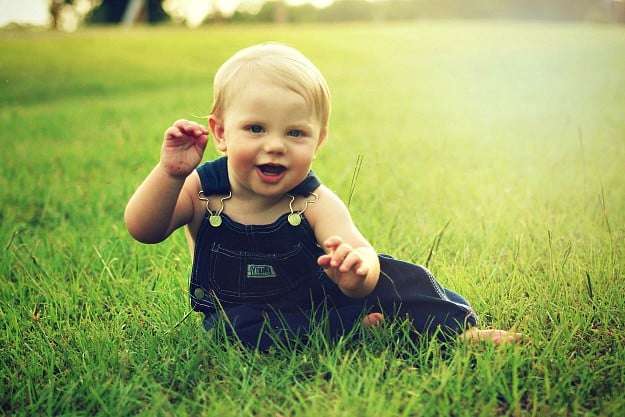When Do Babies Start Talking? Looking Forward To Key Milestones
When do babies start talking? Babies communicate through several stages, so let’s talk about them today!
In this article:
- Early Progress
- The “Advanced Babbling” Stage
- Building Vocabulary
- Starting Sentences
- Hitting Their Stride
- Worried About Missed Milestones?
When Do Babies Start Talking | The Milestones to Watch Out For
This post may contain affiliate links. For my full disclosure policy click here.
Early Progress
When do babies talk? In some ways, babies are born talking. The adorable little sounds your baby makes in the first few months represent important stages toward talking. Following those early “goo-goos” comes babbling, starting as early as 4 months.
These one or two syllable vocalizations mean your baby is learning to make consonants and vowels. To do so, a baby needs to learn to coordinate vocal chords, tongue, palate — and even those first few baby teeth.
Each babbling baby seems to have his/her own favorite sounds to make. Just as they enjoy feeling textures with their fingers, they are experiencing the way it feels to vocalize certain “words.” Top baby favorites are the ones which involve putting the lips together to make them. That means that “m,” “p,” and “b” syllables — as is “buh” — are frequently part of early babbling. You’ll also hear what we think of as vowel-driven exclamations, as in “oh” and “ah.”
The “Advanced Babbling” Stage

As early as 7 months, your baby will begin streaming together those “buh” and “ah” sounds. It will often seem as if he/she is rattling away in a foreign language. In a way, your baby is! He/she is now following the lead of those around him/her who don’t express themselves in single words, but rather, in sentences.
Some babies will have also have learned to associate saying “mama” and “dada” with mom and dad. There may also be syllables that seem to be reserved for the family dog or with wanting a pacifier.
Whether or not your baby is making near-words, it’s important to continue interacting with your baby as if you’re having a conversation. Ask questions — “Is Daddy being funny?” — and wait for the responses. Narrate what you are doing together, such as, “We’re going to get in the car seat now. See, now you’re all buckled in!”
Building Vocabulary
The months following their first birthdays are generally when babies begin saying their first real words. Along with naming objects that are important to them, like “ball,” babies can now make their demands known. If your baby is fickle about being held, expect to hear “up” or “down” a great deal.
Along with words, using appropriate tones when speaking is another significant milestone happening between 13 and 15 months. Babies can now ask for things in either a pleading or commanding tone. They can also convey excitement or curiosity. For example, if he/she wants to know where his/her blanket is, he/she will use the rising inflection now associated with asking questions.
Starting Sentences
So when do kids start talking — really talking? At somewhere between 18 and 24 months, most toddlers begin to string two or more words together. These early sentences represent the milestone people have in mind when they wonder when their kids will talk. Vocabularies at around the 18-month mark typically consist of 50 or fewer words, but a determined young talker can definitely make the most of those few dozen words!
Of course, few toddlers have mastered the finer points of grammar. Expect to hear “Baby go!” rather than “I want to go to the park.” Yet, these basic sentences help get their point across and allow them to express themselves in brand new ways.
Hitting Their Stride

By 24 months, expect to have a regular chatterbox on your hands. Toddlers can now use the right pronouns when referring to themselves or other people — at least some of the time. They can also express their needs through more complex sentences than ever before. For many toddlers, this ability translates into fewer temper tantrums caused by communication frustration. Of course, that doesn’t stop the meltdowns that come when their wishes are denied!
Now that your child is older, he/she isn’t just stringing words into occasional sentences. He/she is using several complete sentences at a time to tell stories. In addition, your child can now hold a dialogue with you for an extended period of time.
Be prepared for your new talker to repeat the same word several times in his/her excitement or to stutter slightly. Of course, you can discuss any concerns about this with a pediatrician. But keep in mind that it’s natural for a toddler to have a mind that’s moving faster than his/her new skill of talking can handle. That’s why toddlers verbally “stall” and have to collect themselves before moving on.
Worried About Missed Milestones?
When should babies start talking — and what if it hasn’t happened yet? It’s natural to worry about those “shoulds” of early childhood, such as at what age do babies talk, walk, hold a cup, and so forth. But the average ages for first words and first sentences are just that — averages. Many non-alarming factors may affect when your baby begins talking earlier or later than average.
What is one sign to give you peace of mind? When your baby keeps making progress. If you’re noticing that he/she is adding new words to his/her vocabulary, as well as saying more complex sentences, you should feel reassured. If he/she seems to have halted or even regressed, arrange an appointment with his/her pediatrician.
Enjoy teaching your baby his/her first words with this video from The Valentin Stories:
https://www.youtube.com/watch?v=JNGpx6t4Wg0
You’re not an obsessive parent if “When do babies talk?” is a question on your mind, but don’t let it preoccupy you. Many of the same things that make infants and toddlers feel loved will also help them reach their verbal milestones. Read to your children even when they are still babies. Talk to them lovingly and frequently. And once they do make their first tentative attempts at talking, be sure to listen!
In your experience, when do babies start talking? What are the words your baby is fond of saying now? Share your experiences and thoughts with us in the comments section below!
Up Next: 13 Child Safety Gadgets

